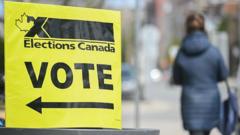Early polls across Canada have reported an unprecedented surge in voter participation, with Elections Canada announcing that over 7.3 million Canadians have already cast their votes—an increase of 25% from the previous 2021 election. These advance polling stations operated for four days during the Easter long weekend, with a record of two million ballots submitted on Friday alone. This substantial turnout translates to approximately a quarter of eligible voters participating early.
Additionally, mail-in voting has seen increased enthusiasm, with over 754,000 special ballots returned to Elections Canada, surpassing the 660,000 collected in 2021. As election day approaches, Canadian federal leaders are ramping up their campaign efforts. Current polling data indicates that the Liberal Party, led by Mark Carney, is in the lead by five points over the opposition Conservative party, led by Pierre Poilievre. Carney has amplified his campaign efforts in regions like Prince Edward Island and Quebec, promoting his party as the best option to navigate challenges posed by US tariffs under President Donald Trump.
In contrast, Poilievre is emphasizing a message focused on change after nine years of Liberal governance and addressing pressing issues like housing affordability and the cost of living. His campaign rhetoric has criticized the incumbent Liberals for government overspending, advocating for a shift in direction for Canadian leadership.
While the Conservatives aim for a comeback, other parties like the Bloc Quebecois and the New Democratic Party trail behind in the polls. As Canadians gear up for the election, key talking points will revolve around trade dynamics with the US, economic strategies, and the future direction of the country.
Additionally, mail-in voting has seen increased enthusiasm, with over 754,000 special ballots returned to Elections Canada, surpassing the 660,000 collected in 2021. As election day approaches, Canadian federal leaders are ramping up their campaign efforts. Current polling data indicates that the Liberal Party, led by Mark Carney, is in the lead by five points over the opposition Conservative party, led by Pierre Poilievre. Carney has amplified his campaign efforts in regions like Prince Edward Island and Quebec, promoting his party as the best option to navigate challenges posed by US tariffs under President Donald Trump.
In contrast, Poilievre is emphasizing a message focused on change after nine years of Liberal governance and addressing pressing issues like housing affordability and the cost of living. His campaign rhetoric has criticized the incumbent Liberals for government overspending, advocating for a shift in direction for Canadian leadership.
While the Conservatives aim for a comeback, other parties like the Bloc Quebecois and the New Democratic Party trail behind in the polls. As Canadians gear up for the election, key talking points will revolve around trade dynamics with the US, economic strategies, and the future direction of the country.




















